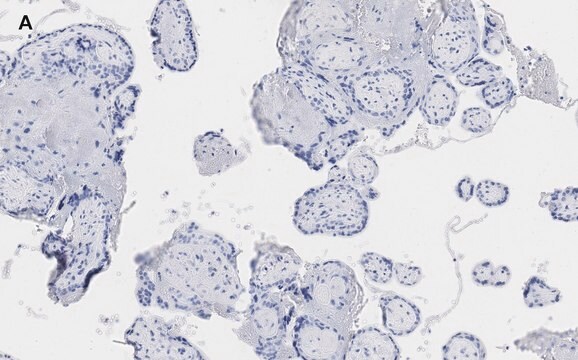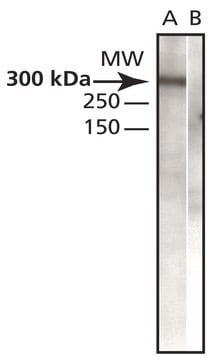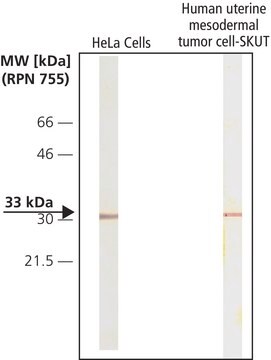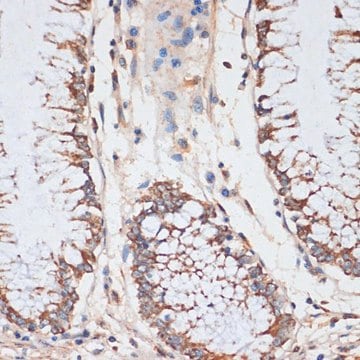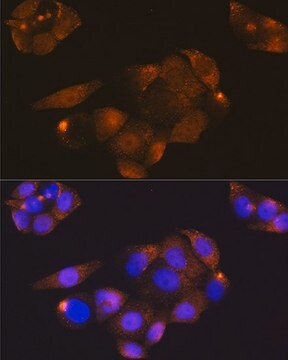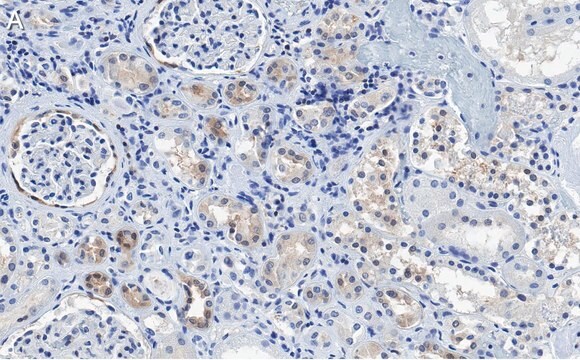General description
We are committed to bringing you greener alternative products, which adhere to one or more of The 12 Principles of Green Chemistry.This antibody is Preservative-free, produced without the harm or sacrifice of animals and exceptionally stable to allow for ambient shipping and storage if needed and thus aligns with "Waste Prevention", "Designing Safer Chemicals" and "Design for Energy Efficiency".
Click here for more information.
ZooMAb® antibodies represent an entirely new generation of recombinant monoclonal antibodies.Each ZooMAb® antibody is manufactured using our proprietary recombinant expression system, purified to homogeneity, and precisely dispensed to produce robust and highly reproducible lot-to-lot consistency. Only top-performing clones are released for use by researchers. Each antibody is validated for high specificity and affinity across multiple applications, including its most commonly used application. ZooMAb® antibodies are reliably available and ready to ship when you need them.
Specificity
Clone 1E19 is a Rabbit recombinant monoclonal antibody that specifically detects Cyclin-dependent kinase 4 (Cdk4). It targets an epitope within 24 amino acids from the C-terminal region.
Immunogen
KLH-conjugated linear peptide corresponding to 24 amino acids from the C-terminal region of human Cyclin-dependent kinase 4 (Cdk4).
Application
Quality Control Testing
Evaluated by Western Blotting in HEK293 cell lysate.
Western Blotting Analysis: A 1:10,000 dilution of this antibody detected Cdk4 in HEK293 cell lysate.
Tested applications
Western Blotting Analysis: A 1:10,000 dilution from a representative lot detected Cdk4 in MCF-7 and Jurkat cell lysates.
Immunocytochemistry Analysis: A 1:1,000 dilution from a representative lot detected Cdk4 in MCF-7 cells.
Affinity Binding Assay: A representative lot of this antibody bound Cdk4 with a KD of 2.5 x 10-9 in an affinity binding assay.
Immunohistochemistry (Paraffin) Analysis: A 1:100 dilution from a representative lot detected Cdk4 in human breast cancer tissue sections.
Note: Actual optimal working dilutions must be determined by end user as specimens, and experimental conditions may vary with the end user
Target description
Cyclin-dependent kinase 4 (UniProt: P11802; also known as EC:2.7.11.22, Cell division protein kinase 4, PSK-J3) is encoded by the CDK4 gene (Gene ID: 1019) in human. Cdk4 is a serine/threonine protein kinase that serves as a component of the cyclin D-Cdk-4 complexes that phosphorylates and inhibit members of the retinoblastoma (RB) protein family, including RB1, and regulate the cell-cycle during G1/S transition. Phosphorylation of RB1 allows dissociation of the transcription factor E2F from the RB/E2F complexes and the subsequent transcription of E2F target genes which are responsible for the progression through the G1 phase. Cyclin D-Cdk4 complexes are major integrators of various mitogenic and antimitogenic signals. Cdk4 is also reported to phosphorylate SMAD3 in a cell-cycle-dependent manner and represses its transcriptional activity. Its protein kinase domain is localized in amino acids 6-295 and amino acids 50-56 are required for its binding to D-type cyclins. Its phosphorylation at threonine 172 and binding of a D-type cyclin are shown to be essential for its enzymatic activity. Full activation of the cyclin-D-CDK4 complex appears to require other factors such as recruitment of the substrate via a substrate recruitment motif, and/or formation of the Cyclin Dependent Kinase Inhibitor 1B (CDKN1B) ternary complex. Formation of this complex is also essential for its translocation to the nucleus. This ZooMAb® recombinant monoclonal antibody, generated by our propriety technology, offers significantly enhanced specificity, affinity, reproducibility, and stability over conventional monoclonals.
Physical form
Purified recombinant rabbit monoclonal antibody IgG, lyophilized in PBS, 5% Trehalose, normal appearance a coarse or translucent resin. The PBS/trehalose components in the ZooMAb formulation can have the appearance of a semi-solid (bead like gel) after lyophilization. This is a normal phenomenon. Please follow the recommended reconstitution procedure in the data sheet to dissolve the semi-solid, bead-like, gel-appearing material. The resulting antibody solution is completely stable and functional as proven by full functional testing. Contains no biocide or preservatives, such as azide, or any animal by-products. Larger pack sizes provided as multiples of 25 μL.
Reconstitution
300 μg/mL after reconstitution at 25 μL per vial. Please refer to guidance on suggested starting dilutions and/or titers per application and sample type.
Storage and Stability
Recommend storage of lyophilized product at 2-8°C; Before reconstitution, micro-centrifuge vials briefly to spin down material to bottom of the vial; Reconstitute each vial by adding 25 μL of filtered lab grade water or PBS; Reconstituted antibodies can be stored at 2-8°C, or -20°C for long term storage. Avoid repeated freeze-thaws.
Legal Information
ZooMAb is a registered trademark of Merck KGaA, Darmstadt, Germany
Disclaimer
Unless otherwise stated in our catalog or other company documentation accompanying the product(s), our products are intended for research use only and are not to be used for any other purpose, which includes but is not limited to, unauthorized commercial uses, in vitro diagnostic uses, ex vivo or in vivo therapeutic uses or any type of consumption or application to humans or animals.

